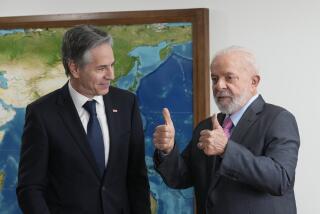Brazil Steps Up Efforts to Refinance Its Debt
- Share via
RIO DE JANEIRO — Brazil has begun a last-ditch effort to obtain help in refinancing its $100-billion foreign debt.
Finance Minister Danilo Funaro and Fernao Bracher, president of the central bank, flew to Washington on Wednesday for meetings with Jacques de Larosiere, managing director of the International Monetary Fund, and Paul A. Volcker, chairman of the U.S. Federal Reserve Board.
The scheduled meeting with De Larosiere appears to represent a change in the position of aloofness that the Brazilian government has recently maintained toward the IMF. Funaro told reporters before leaving for Washington: “The IMF is very important to the banks.”
Funaro has been in poor health, and this has raised added questions about Brazil’s ability to deal with its debts. Funaro told the press that he had resumed chemotherapy for lymphatic cancer but that he will not reduce his 15-hour-a-day work schedule.
More than 700 U.S. and other foreign banks that hold Brazil’s debt have been waiting for the IMF’s evaluation of Brazil’s economic program, which calls for renewing $15 billion in short-term credits to Brazil and refinancing on longer terms another $15 billion due in principal payments.
Won’t Renew 1982 Pact
The short-term credits expire Jan. 17, and failure to renew them would plunge Brazil, a country of 135 million people, into financial crisis. But the banks would also lose. Brazil could be expected to suspend payments on interest and fees that returned $12 billion to foreign banks last year.
President Jose Sarney, who took office in March as Brazil’s first civilian president in 21 years, has refused to renew an economic stabilization agreement that was undertaken in 1982 by the IMF and the military government. The pact specified that public spending would be restricted under international controls, but Sarney’s political coalition resists this as unpopular in an election year.
Other major Latin American debtor countries--among them Mexico, Argentina and Chile--have accepted stabilization agreements with the IMF as a condition for debt refinancing. But Venezuela and Colombia have avoided entering into formal agreements with the IMF and have negotiated a rescheduling of their foreign debts.
Among Latin American debtor nations, Brazil’s economic position is the strongest, and last year its economy was among the fastest growing in the world. In each of the past two years it has had a trade surplus of $12 billion, and it is up to date on foreign debt interest payments. The central bank has $9 billion in foreign reserves.
More Public Spending
Sarney, who has promised “recession never again,” raised wages and increased public spending last year. This led to economic growth of more than 7% and to the creation of 1.5 million new jobs. But inflation increased for the third straight year; the 1985 rate was 233%.
In November, the pro-government majority in Brazil’s Congress approved a package of budget and tax legislation designed to reduce the deficit. Funaro has predicted that this will cut inflation to 160% this year.
But there is widespread skepticism in Brazilian business and academic circles over the effectiveness of the Funaro reforms. Most forecasts are for increasing inflation, particularly in light of higher food prices brought on by a severe drought and the lack of effective controls on public spending.
Funaro said he hopes to convince De Larosiere and Volcker that Brazil has put in place an economic program for 1986 that deserves international support.
Between 1982 and last year, the IMF signed five stabilization agreements with Brazil that paved the way for more than $10 billion in new loans from foreign banks. Brazil did not fulfill the terms of the five agreements, and each of them had to be renegotiated.
More to Read
Sign up for Essential California
The most important California stories and recommendations in your inbox every morning.
You may occasionally receive promotional content from the Los Angeles Times.













